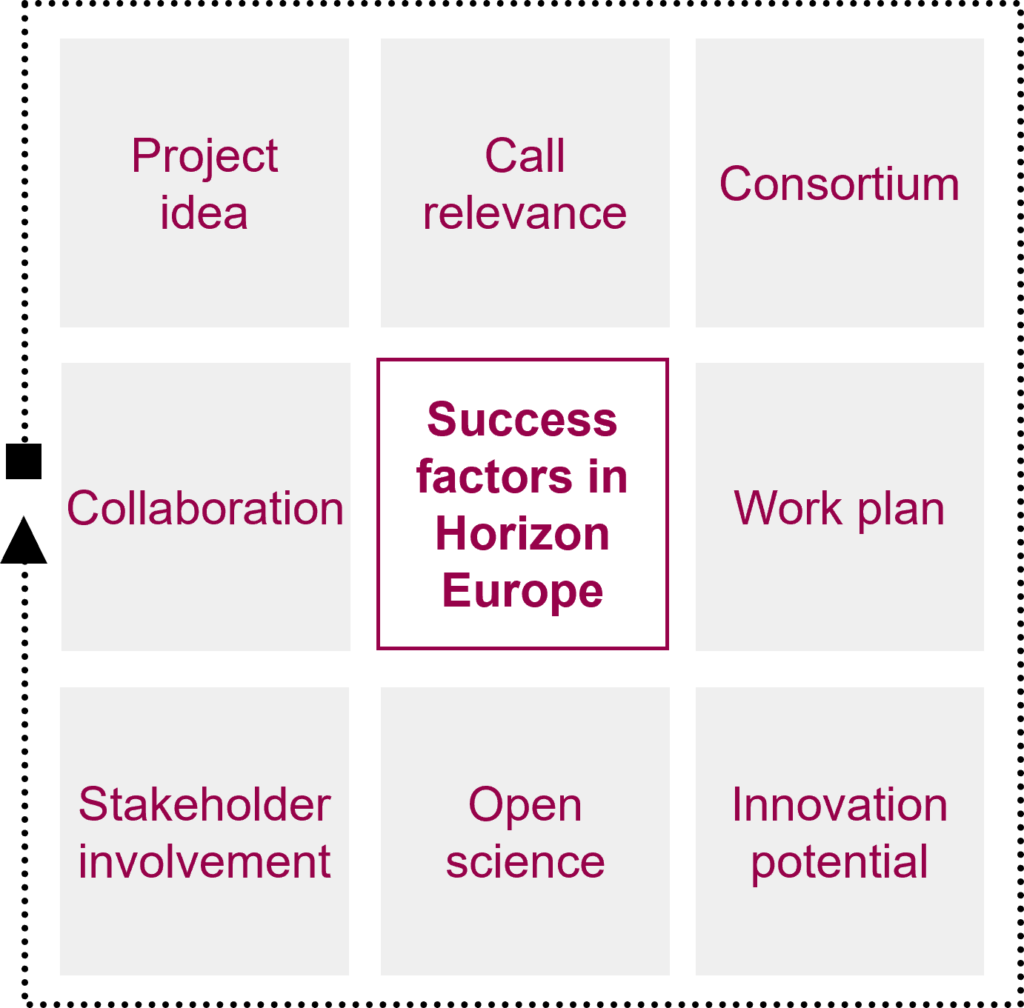Succeeding in the first Horizon EU Health proposals – sharing of experience
15th February 2022 at 3:35 pm
On 31 January 2022, the results of the first Horizon Europe Cluster 1 – Health calls with a submission deadline on 21 September 2021 were announced. All project coordinators and partners received their project-specific Evaluation Summary Report (ESR) and either a rejection or invitation letter to start the grant preparations.
Although the success rates were expected to be high compared to previous Horizon 2020 calls as analysed in one of our earlier Health posts, the number of proposals selected for funding is yet unknown. This applies to the call topics under HORIZON-HLTH-2021-STAYHLTH, HORIZON-HLTH-2021-ENVHLTH, HORIZON-HLTH-2021-DISEASE, HORIZON-HLTH-2021-CARE, HORIZON-HLTH-2021-TOOL, and HORIZON-HLTH-2021-IND. While waiting for the final statistics that are typically published on the EU Funding & Tenders Portal within the specific call topic, we are glad to already share our experience from the ESRs of the successful health proposal that we were able to support. This might help applicants who are currently preparing their proposals for the fast-approaching next major deadline for single-stage submissions on 21 April 2022 and for stage-2 proposal applicants who submitted their short proposal to the deadline on 1 February 2022.
Must-haves in Horizon Europe Health proposals

Thanks to the ESRs of the proposals we were involved in, we learned which factors three independent evaluators paid attention to. In the Excellence part, representing the first of the three evaluation criteria, evaluators were focused on:
- the degree of innovation, the level of ambition and risk;
- the tangibility of the proposal’s objectives: We recommend following the S.M.A.R.T. concept for the definition of objectives, namely specific, measurable, attainable, realistic and timebound;
- the importance of a clear and comprehensive description of the methodology;
- the gender dimension as well as some of the other methodological aspects, such as open science practices and research data management, were looked at more closely than initially expected by us.
The comments regarding the second evaluation criterion, the Impact part, were of particular interest to us as Horizon Europe has brought numerous changes to this section. For example:
- the Key Impact Pathways (KIPs) introduced for Horizon Europe proposals as a means to describe the expected project results need to be credible and realistic;
- the planned communication and dissemination measures must address a diverse range of stakeholders and their needs;
- a clear exploitation plan for planned results, be it commercial or non-commercial, made a difference and it seems that a detailed IPR plan was expected by the reviewers.
One of our strategies is always to start working on the Impact chapter early in the process and to get all partners involved, a strategy that has proven successful with a straight “5” in the Impact, the maximum score. Looking at the Implementation part, the third evaluation criterion, we noticed that the evaluators were looking for:
- a realistic work plan with clear milestones, outcomes (deliverables) and task identification for each project partner, as well as indicating interdependences between work packages and following a logical work flow;
- appropriate resource allocation and justified efforts for the proposed work;
- a detailed contingency plan with several scientific and non-scientific risks and very specific mitigation measures;
- a multi-disciplinary approach and partners from different disciplines, organisation types and with a clear distribution of roles; the involvement of a patient advocacy group or patient organisation seemed to be a bonus, if not a requirement.
Nice-to-haves to make Health proposals even more compelling
Based on our experience from the first Health calls, we think that there are several points that make the difference in the proposal evaluation. These include the visualisation of the project`s key messages, such as an infographic on the medical need four your proposal, a figure illustrating the project concept on the first pages of the main proposal document Part B, as well as a competitor analysis or a comparison to similar technologies and approaches to show the differences, advantages, and innovation of your solution. Additionally, a thorough elaboration of the new mandatory business canvas table can help demonstrate the proposed solution, its benefits, and its future applications. This might just convince the evaluators of your project! Lastly, given that the former Part B2, where under Horizon 2020 all partner profiles were collected, is no longer included in Horizon Europe, and that the expertise and assets of the project partners can be hardly demonstrated in the online forms (Part A in the EU Funding & Tenders portal), the description of the consortium in section 3 of Part B is critical in our view.
Call-specific requirements
For the upcoming deadline in April, we recommend that you assess the specific requirements of the call (please see list below) to which you are applying carefully. The scope needs to be addressed in the Excellence section 1 while the expected impacts need to be taken up in chapter 2, the Impact. In several calls, it is clearly stated whether you need to collaborate with other initiatives, make use of existing databases or EU infrastructures and include specified organisations.
List of call topics in the Horizon Europe health cluster, with the deadline on 21 April 2022:
- HORIZON-HLTH-2022-STAYHLTH-02-01: Personalised blueprint of chronic inflammation in health-to-disease transition (RIA)
- HORIZON-HLTH-2022-ENVHLTH-04-01: Methods for assessing health-related costs of environmental stressors (RIA)
- HORIZON-HLTH-2022-DISEASE-07-01: Support for the functioning of the Global Research Collaboration for Infectious Disease Preparedness (GloPID-R) (CSA)
- HORIZON-HLTH-2022-DISEASE-07-02: Pandemic preparedness (RIA)
- HORIZON-HLTH-2022-DISEASE-07-03: Non-communicable diseases risk reduction in adolescence and youth (RIA)
- HORIZON-HLTH-2022-DISEASE-03-01: European partnership fostering a European Research Area (ERA) for health research (COFUND)
- HORIZON-HLTH-2022-CARE-08-02: Pre-commercial research and innovation procurement (PCP) for building the resilience of health care systems in the context of recovery (PCP)
- HORIZON-HLTH-2022-CARE-08-03: Public procurement of innovative solutions (PPI) for building the resilience of health care systems in the context of recovery (PPI)
- HORIZON-HLTH-2022-CARE-08-04: Better financing models for health systems (RIA)
- HORIZON-HLTH-2022-CARE-10-01: European partnership on transforming health and care systems (COFUND)
- HORIZON-HLTH-2022-TOOL-11-01: Optimising effectiveness in patients of existing prescription drugs for major diseases (except cancer) with the use of biomarkers (RIA)
- HORIZON-HLTH-2022-TOOL-11-02: New methods for the effective use of real-world data and/or synthetic data in regulatory decision-making and/or in health technology assessment (RIA)
- HORIZON-HLTH-2022-IND-13-01: Enhancing cybersecurity of connected medical devices (RIA)
- HORIZON-HLTH-2022-IND-13-02: Scaling up multi-party computation, data anonymisation techniques, and synthetic data generation (RIA)
- HORIZON-HLTH-2022-IND-13-03: New pricing and payment models for cost-effective and affordable health innovations (RIA)
- HORIZON-HLTH-2022-IND-13-04: Setting up a European Smart Health Innovation Hub (CSA)
- HORIZON-HLTH-2022-IND-13-05: Setting up a European Electronic Health Record Exchange Format (EEHRxF) Ecosystem (CSA)
Proposal writing support by our experienced team at accelopment
We have long-standing experience in actively supporting grant applications in health-related fields. Our track record in the new Horizon Europe programme could not start earlier, as we supported the now funded COVend proposal for the very first Horizon Europe deadline, an emergency call to fight the coronavirus and its variants, and just got the first Health proposals approved under the call topics HORIZON-HLTH-2021-TOOL-06-02 and HORIZON-HLTH-2021-DISEASE-04-01.
We are currently involved in several ongoing Health projects in Horizon 2020: AI-Mind, VANGUARD, EXIMIOUS and EURO SHOCK (all Research and Innovation Actions) and the COVID-19 focused Innovation Action ENVISION. Additionally, we have been a partner organisation in many health-related Horizon 2020 Innovative Training Networks, including AGePOP, CAPSTONE, CONSENSE and InPharma. With our expertise in more than 50 FP7 and Horizon 2020 projects, we assist Coordinators with administration and management tasks and support the dissemination and exploitation of project results.
For more information about our proposal preparation services for Health projects, please contact Jeanette Müller or Andreia Cruz.
Interested in further health-related funding opportunities? Please contact our experts in EU funding programmes.

Andreia Cruz
Research & Innovation Project Manager

